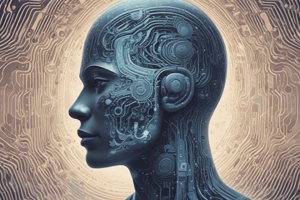Podcast
Questions and Answers
What role does AI play in decision-making processes for businesses?
What role does AI play in decision-making processes for businesses?
- AI complicates data interpretation
- AI restricts access to data
- AI analyzes data to support decision-making (correct)
- AI eliminates the need for human intervention
AI-powered customer support systems do not personalize interactions based on user data.
AI-powered customer support systems do not personalize interactions based on user data.
False (B)
Name one medical application of AI.
Name one medical application of AI.
Early disease detection
AI algorithms can analyze ______ to extract valuable insights.
AI algorithms can analyze ______ to extract valuable insights.
Match the AI applications with their benefits:
Match the AI applications with their benefits:
How do AI-based recommendation systems enhance user experience?
How do AI-based recommendation systems enhance user experience?
AI technologies improve safety by randomly alerting security personnel.
AI technologies improve safety by randomly alerting security personnel.
What is one way AI analyzes customer behavior?
What is one way AI analyzes customer behavior?
What does the initial state in a problem represent?
What does the initial state in a problem represent?
The problem space includes only the initial state and goal state.
The problem space includes only the initial state and goal state.
What is the main focus of the Water Jug Problem?
What is the main focus of the Water Jug Problem?
A problem can be represented as a _____ or a graph.
A problem can be represented as a _____ or a graph.
Match the following components with their descriptions:
Match the following components with their descriptions:
Which of the following describes the set of operators in a state space search?
Which of the following describes the set of operators in a state space search?
The final states in a problem space are always desirable.
The final states in a problem space are always desirable.
In the context of a board game, what does the board represent?
In the context of a board game, what does the board represent?
Which type of reasoning allows for conclusions that must be true if the premises are true?
Which type of reasoning allows for conclusions that must be true if the premises are true?
Inductive reasoning begins with specific premises to reach a general conclusion.
Inductive reasoning begins with specific premises to reach a general conclusion.
What type of reasoning is directly opposed to deductive reasoning?
What type of reasoning is directly opposed to deductive reasoning?
In AI, deductive reasoning is also known as ______ reasoning.
In AI, deductive reasoning is also known as ______ reasoning.
Match the following types of reasoning to their descriptions:
Match the following types of reasoning to their descriptions:
What is an example of a premise in deductive reasoning?
What is an example of a premise in deductive reasoning?
Non-monotonic reasoning allows for conclusions to change with new information.
Non-monotonic reasoning allows for conclusions to change with new information.
Which reasoning type involves making conclusions based on the best available evidence?
Which reasoning type involves making conclusions based on the best available evidence?
What are production systems primarily used for in artificial intelligence?
What are production systems primarily used for in artificial intelligence?
The inference engine in a production system is responsible for storing data in the working memory.
The inference engine in a production system is responsible for storing data in the working memory.
What is the purpose of a knowledge base in a production system?
What is the purpose of a knowledge base in a production system?
A production system consists of a set of production rules, each with a condition and an ______.
A production system consists of a set of production rules, each with a condition and an ______.
Match the components of a production system with their functions:
Match the components of a production system with their functions:
Which of the following areas utilizes production systems?
Which of the following areas utilizes production systems?
Knowledge representation is not significant for AI systems.
Knowledge representation is not significant for AI systems.
What enables machines to reason and make decisions in AI systems?
What enables machines to reason and make decisions in AI systems?
What is the primary characteristic of inductive reasoning?
What is the primary characteristic of inductive reasoning?
Inductive reasoning ensures that the conclusion is true if the premises are true.
Inductive reasoning ensures that the conclusion is true if the premises are true.
What type of reasoning searches for the most plausible explanation for a given observation?
What type of reasoning searches for the most plausible explanation for a given observation?
Common sense reasoning is learned through __________.
Common sense reasoning is learned through __________.
Match the type of reasoning with its description:
Match the type of reasoning with its description:
What is an example of a premise in abductive reasoning?
What is an example of a premise in abductive reasoning?
Common sense reasoning relies on exact reasoning to make conclusions.
Common sense reasoning relies on exact reasoning to make conclusions.
Provide an example of an implication used in abductive reasoning.
Provide an example of an implication used in abductive reasoning.
Flashcards are hidden until you start studying
Study Notes
Improved Decision-Making and Customer Experience
- AI systems can analyze vast datasets, identify patterns, and derive insights to enhance decision-making in businesses, resulting in better outcomes.
- AI-powered chatbots and virtual assistants provide personalized, real-time customer support, improving overall customer experience.
- Natural language processing allows AI to understand and respond to customer queries efficiently.
Advanced Data Analysis & Personalized Recommendations
- AI algorithms utilize machine learning techniques to extract valuable insights from large datasets, enabling better understanding of customer behavior and market trends.
- Recommendation systems use user preferences and historical data to offer personalized suggestions across e-commerce and content platforms, enhancing user engagement.
Medical Advancements
- AI can transform healthcare by improving early disease detection and accurate diagnoses through analysis of medical images and patient records.
Safety and Security Enhancements
- AI technologies enhance safety by detecting anomalies in surveillance, fraud detection, and cyber security, identifying threats in real time.
Problems and Problem Spaces
- Problems consist of an initial state, goal state, and actions/operators that transition one state to another.
- The problem space includes all potential states and actions relevant to a problem, represented graphically with nodes (states) and edges (actions).
State Space Search
- State space search involves representing all possible states a system can occupy, alongside a set of operators to transition from one to another.
- Initial and final states are defined, with some final states being desirable and others not.
The Water Jug Problem
- A classic AI puzzle that optimizes the measurement of a specified quantity of water using two or more water jugs, relevant for understanding optimization in decision-making.
Production Systems
- Production systems consist of rules for task execution, involving conditions and actions.
- Used in AI for problem-solving, featuring components such as:
- Knowledge base: Holds factual information for decision-making.
- Inference engine: Analyzes the knowledge base for conclusions.
- Working memory: Stores information about current situations.
- Control strategy: Determines the actions taken based on established rules.
Knowledge Representation
- Essential for AI, knowledge representation involves organizing knowledge in a manner understandable by computational systems to facilitate reasoning and informed decision-making.
Types of Reasoning
- Deductive reasoning: Derives specific conclusions from general premises; conclusions must be true if premises are true.
- Inductive reasoning: Generalizes from specific data; conclusions may not necessarily follow from premises.
- Abductive reasoning: Seeks the most plausible explanation for observations; conclusions do not guarantee truth.
- Common sense reasoning: Utilizes experiential knowledge to make reasonable assumptions about everyday occurrences.
Examples of Reasoning
- Deductive Reasoning: General principle leads to a specific conclusion.
- Inductive Reasoning: Generalization from observed data, e.g., assuming all observed pigeons in a zoo are white.
- Abductive Reasoning: Infers the best explanation from observations, e.g., a wet cricket ground implies it has been raining.
- Common Sense Reasoning: Based on everyday assumptions, e.g., one person can't occupy multiple places simultaneously.
Studying That Suits You
Use AI to generate personalized quizzes and flashcards to suit your learning preferences.




